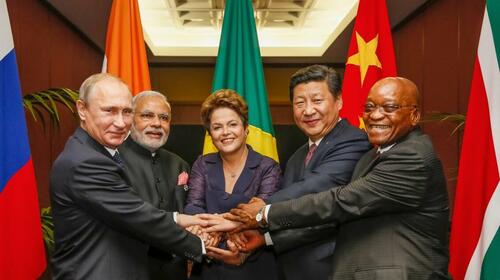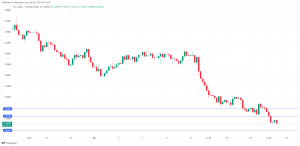Economics
Five Arab States Plus Iran Among 19 Nations Ready To Join BRICS
Five Arab States Plus Iran Among 19 Nations Ready To Join BRICS
Via The Cradle,
Saudi Arabia, the UAE, Algeria, Egypt, Bahrain, and Iran…

Five Arab States Plus Iran Among 19 Nations Ready To Join BRICS
Saudi Arabia, the UAE, Algeria, Egypt, Bahrain, and Iran have formally asked to join the BRICS group of nations as it prepares to hold its annual summit in South Africa.
In total, 19 nations have expressed interest in joining the emerging-markets bloc of Brazil, Russia, India, China, and South Africa, according to Anil Sooklal, South Africa’s ambassador to the group.
“What will be discussed is the expansion of BRICS and the modalities of how this will happen… Thirteen countries have formally asked to join, and another six have asked informally. We are getting applications to join every day,” the South African official told Bloomberg earlier this week.
BRICS will hold its annual summit in Cape Town during the first week of June. The foreign ministers from all five member states have confirmed their attendance.
Earlier this month, Bloomberg revealed that BRICS is expected to soon surpass the US-led G7 states in economic growth expectations.
Per their analysis, while G7 and BRICS nations each contributed equally to global economic growth in 2020, the western-led bloc’s performance has recently declined. By 2028, the G7 is expected to make up just 27.8 percent of the global economy, while BRICS will make up 35 percent.
The estimations came just a few weeks after the Deputy Chairman of Russia’s State Duma, Alexander Babakov, revealed that BRICS is working on developing a “new currency” that will be presented at the organization’s upcoming summit.
BRICS member states account for over 40 percent of the global population and around a quarter of the global GDP.
The interest from Global South nations to join the bloc comes at a time when more and more governments move away from the US dollar.
The greenback has become more unreliable for dollarized economies due to rising interest rates regulated by the US Federal Reserve (FED) and the bank’s weaponization of the dollar through financial sanctions.
In addition, the west – especially Europe – is facing a growing energy crisis resulting from sanctions targeting Russian energy markets due to its invasion of Ukraine and the US sabotage of the Nordstream pipeline.
Tyler Durden
Tue, 05/02/2023 – 03:30
dollar
markets
reserve
interest rates
fed
us dollar

Argentina Is One of the Most Regulated Countries in the World
In the coming days and weeks, we can expect further, far‐reaching reform proposals that will go through the Argentine congress.
Crypto, Crude, & Crap Stocks Rally As Yield Curve Steepens, Rate-Cut Hopes Soar
Crypto, Crude, & Crap Stocks Rally As Yield Curve Steepens, Rate-Cut Hopes Soar
A weird week of macro data – strong jobless claims but…
Fed Pivot: A Blend of Confidence and Folly
Fed Pivot: Charting a New Course in Economic Strategy Dec 22, 2023 Introduction In the dynamic world of economics, the Federal Reserve, the central bank…




















